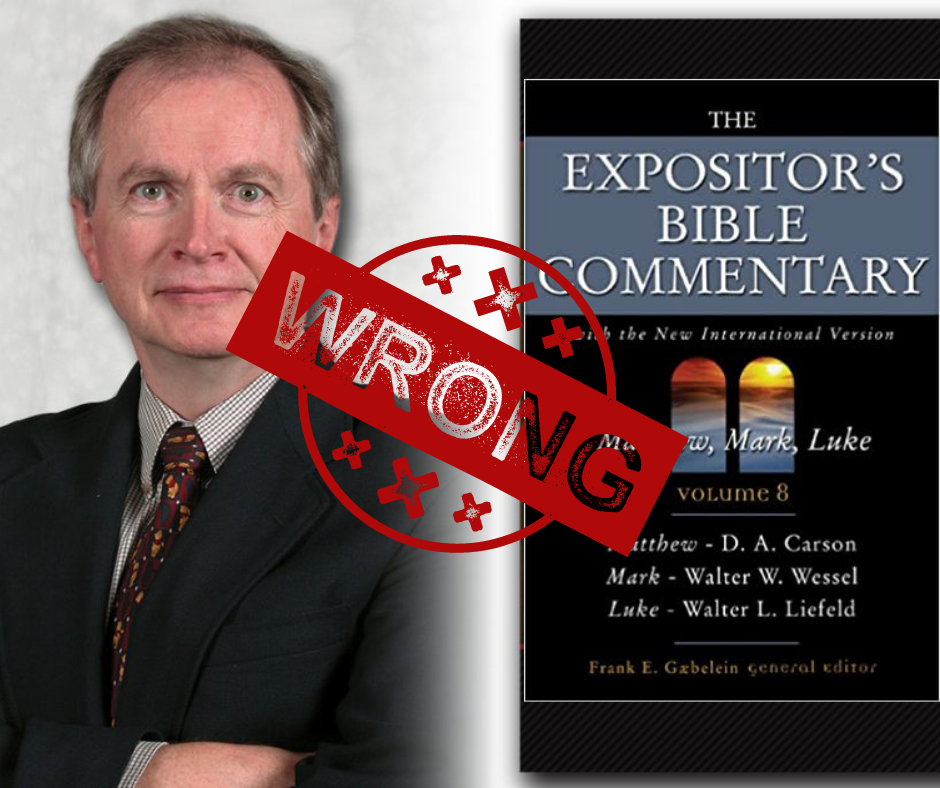Audio accessibility for this blog post is powered by Microsoft Text-to-Speech technology. These recordings are provided for personal, non-commercial educational use only.
It’s been a long time since I wrote a blog post that wasn’t a book review. Frankly, this one wouldn’t have been written,1 but as I was doing research for my upcoming Sermon On The Mount series, I found that I had written such a long note in Logos, I might as well share my thoughts here. The note is certainly long enough to be a blog article, so why not?
In his commentary “Matthew,” in The Expositor’s Bible Commentary: Matthew, Mark, Luke, ed. Frank E. Gaebelein, vol. 8, D.A Carson wrote:
“Matthew] 5:44-47 Jesus allowed no casuistry. The real direction indicated by the law is love, rich and costly, and extended even to enemies. Many take the verb “love” (agapaō) and the noun (agapē) as always signifying self-giving regardless of emotion. For instance, Hill (Matthew) comments on this passage. “The love which is inculcated is not a matter of sentiment and emotion, but, as always in the OT and NT, of concrete action.” If this were so, 1 Corinthians 13:3 could not disavow “love” that gives everything to the poor and suffers even to martyrdom; for these are “concrete actions.” The same verb is used when Amnon incestuously loves his half-sister Tamar (2 Sam 13:1 LXX); when Demas, because he loves this world (2 Tim 4:10), forsakes Paul; and when tax collectors love those who love them (Matt 5:46).
The rise of this word group in Greek is well traced by Robert Joly, Ἀγαπᾶν et Φιλεῖν: Le vocabulaire chretien de l’amour, est-il original? (Bruxelles: Presses Universitaires, 1968). Christians doubtless took over the word group and largely filled it with their own content; but the content of that love is not based on a presupposed definition but on Jesus’ teaching and example. To love one’s enemies, though it must result in doing them good (Luke 6:32–33) and praying for them (Matt 5:44), cannot justly be restricted to activities devoid of any concern, sentiment, or emotion. Like the English verb “to love,” agapaō ranges widely from debased and selfish actions to generous, warm, costly self-sacrifice for another’s good. There is no reason to think the verb here in Matthew does not include emotion as well as action.”2
And here’s the lengthy note I wrote in Logos taking Carson to task;
It would seem that if warm and fuzzy feelings is what Jesus has in mind when he tells us to love our enemies, then Jesus’ command is one of the most unreasonable commands in the entire Bible. For who could FEEL fondly towards someone who treats them badly, persecutes them, is cruel, and so on? You can control your actions, but not how you feel. How then are we to understand love for our enemies if not to SHOW love? I doubt even Jesus LIKED Caiaphas and the people who beat and slapped him at his trial.
Fond feelings sometimes can flow from doing good to someone, even an enemy. As C.S Lewis once put it “Do not waste time bothering whether you ‘love’ your neighbor; act as if you did. As soon as we do this we find one of the great secrets. When you are behaving as if you loved someone, you will presently come to love him.” Do the action of love first. If your enemy is hungry, give him something to eat, even though you may do it through gritted teeth and nausea. If your enemy is thirsty, give him something to drink, though you may have a strong desire to bash him over the head with the pitcher.
Moreover, since 1 Corinthians 13 was brought up, let’s look at it. You’ll find very little by way of emotion in here. It says “love is kind”. Do you have to feel a certain way to BE kind to someone? Even if I dislike you, I am showing love to you by giving you money when you are down on your luck. “Love keeps no record of wrongs”. Do I have to like someone to refuse to keep track of how many times they’ve sinned and how many sins they’ve committed against me? Of course not! “Love does not dishonor others”. Again, whatever counts as dishonor, do I have to feel warm and fuzzy when I think about you in order to avoid doing that? Slapping someone with the back of the hand was considered a great insult in Jesus’ culture. I may not like you, but I can avoid back-hand-slapping you. I can avoid publically shaming you regardless of how I feel about you. “Love always protects”. Do I have to like you to protect you? “Love is patient”. While this may seem like an emotion, I would argue that it really isn’t. Regardless of how antsy I may feel, I can choose not to express it. I can choose not to say “Hurry up! We don’t have all day.”
The only places emotions are even mentioned are things such as “love is not easily angered” and “love rejoices in the truth”. Indeed. But then, I would not argue that love is NEVER divorced from feelings. Sometimes I feel fondly for someone and THAT is why I choose to love them via my actions. Sometimes I choose to love someone via my actions and, over time, my good choices shape my cold and callous heart and I begin to feel warmly towards them. To like someone may prompt you to love them, or vice versa. All I’m arguing is that love is not synonymous with love to the extent that, as Carson argues, if the emotion is absent, then love is absent.
What Carson is really taking “love” here to mean is “like”. We are never commanded to LIKE our enemies, or anyone else for that matter. We are commanded to love them.
The appeals to verses such as 2 Samuel 13:1 and 2 Timothy 4:10 in the LXX has some force, but does it really prove what Carson wants it to prove? It is possible that perhaps, as some modern westerners use the word “love” as synonymous with infatuation and feelings of fondness, ancient Greek speakers did the same with their four words describing “the four loves”. Even I, who does not consider love an emotion, will sometimes use it in that way because I am accustomed to the idioms of my culture. “I just fell in love with the new sandwich at my favorite restaurant”, “I love this movie”, “I love this anime”, “I love going for a walk on a sunny spring day”. I am not contradicting my belief that love is not an emotion. I am just captive to the idioms of my culture. I say things like this in spite of myself. Perhaps Paul the apostle used agape to refer to fond feelings likewise.
The real thorn in my hypothesis is 1 Corinthians 13:3 for here Paul describes loving actions and says “If I do these and have not love, I gain nothing.”
BibleRef.com provides one possible answer; “Why would someone give away all their money or even their life if not out of love for Christ and others? Perhaps a person might do such a thing for pride or glory or in a foolish attempt to earn God’s favor. Love, though, is the only motive that makes such sacrifices worthwhile.”3
The question “Why would you even do such extreme acts as give away everything you have or turn your body over if not out of love?” is a good question. If Thomas Aquinas was right to define love as “A desire and will for the best of others”, then if my my motive is not to better my neighbor or my enemy, to leave them with more benefits than with they started (or none at all), then it is not love. While I hold strongly that love need not be attached to feelings of fondness, I would never say love is detached from motive. If you do loving things for motives other than to benefit the person to whom you are doing loving things for, then you have not love. If your motive for doing something nice for someone is to have them do the same to you in the future, that’s not love. That’s manipulation. If you give me food, water, clothing, and shelter in order to place me in your debt which you can call upon at any time, that’s not love. If you do 100 nice things for me so that others will see just how Christian you are, that’s not love, and Jesus had much to say about this in the sermon on the mount (Matthew 6:1-8).
I’m not really feeling fondly of D.A Carson right now for saying something so ridiculous as that we should feel fondly about our enemies, but if he ever needed anything out of me, I’d give it to him. And my dislike is not a permanent disposition toward him. I can love even if I don’t like. Loving someone and liking someone are. not. the. same.
I will also say that we should always TRY to “like” someone. We should try to soften our hearts towards someone. And in my experience, praying for God to help us with that, doing acts of kindness for those who have abused us, and refusing to hold onto the resentful emotions, usually helps. As C.S Lewis said in the above quote essentially; do the acts of love first, and feelings of fondness may follow. Be loving first and wait for your heart to catch up. Don’t wait until you like someone (enemy or not) before you show kindness to them. And when you do, you may find your heart gradually warming toward the person over time. But in the final analysis, “love” and “like” are not synonyms. Love is not just a digivolution of “like”, a bigger, stronger form of like, as Greymon is to Agumon. They’re totally different categories. One may bring about the other, but they’re not identical. A is A. A is not Non-A.
So, I guess it’s say to say that Carson lit a fire under me. Again, I didn’t initially intend on writing a full blown rebuttal, but when I pulled up my notes, my mind and fingers wouldn’t stop.
I hope you’ll subscribe to The Cerebral Faith YouTube channel and turn on notifications so you’ll be able to tune in to the live webshow called “Cerebral Faith Live”. I always field Q&A after every presentation. All you need to do is leave your question in the live chat. I will be doing a full blown series on The Sermon On The Mount on Cerebral Faith Live sometime in early July. The YouTuber in me wants to sign off of this blog article with my usual outtro, which just goes to show you how much of my writing has gone to video scripts as opposed to the blog. Haha
NOTES
1: Because if I figure if I’m going to type up a lot of stuff anyway, it might as well be a video script. YouTube and Podcasts seem to be where most people go nowadays. The way of the blogger seems dead, imo. Albeit, I still get some people commenting on the blog or telling me they read this or that article. But I just want to be where the people are, like Ariel. And I figure if lots of typing is required of me, it might as well be a video script.
2: D. A. Carson, “Matthew,” in The Expositor’s Bible Commentary: Matthew, Mark, Luke, ed. Frank E. Gaebelein, vol. 8 (Grand Rapids, MI: Zondervan Publishing House, 1984), 157–158.
3: BibleRef.com, “What Does 1 Corinthians 13:3 Mean?”, —https://www.bibleref.com/1-Corinthians/13/1-Corinthians-13-3.html
Share this:
- Share on Facebook (Opens in new window) Facebook
- Share on X (Opens in new window) X
- Print (Opens in new window) Print
- Email a link to a friend (Opens in new window) Email
- Share on Pinterest (Opens in new window) Pinterest
- Share on Reddit (Opens in new window) Reddit
- Share on LinkedIn (Opens in new window) LinkedIn
- Share on Tumblr (Opens in new window) Tumblr
Discover more from Cerebral Faith
Subscribe to get the latest posts sent to your email.





Color me crazy, but I didn’t think is point in that section was what you thought it meant. To me, it sounded like he was trying to make the point that the word for “love” doesn’t have this singular meaning in only one context, but rather multifaceted and multicontextual. The agrape word was used more generically than people like to acknowledge, at least that is what I took from this section